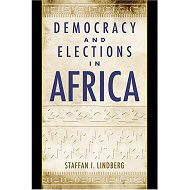|
Democracy and Elections in Africa
|
|
Staffan I. Lindberg
|

|

This volume studies elections as a core institution of liberal democracy in the context of newly democratizing countries. Political scientist Staffan I. Lindberg gathers data from every nationally contested election in Africa from 1989 to 2003, covering 232 elections in 44 countries. He argues that democratizing nations learn to become democratic through repeated democratic behavior, even if their elections are often flawed.
Refuting a number of established hypotheses, Lindberg finds no general negative trend in either the frequency or the quality of African elections. Rather, elections in Africa, according to his findings, are more than just the goal of a transition toward democracy or merely a formal procedure. The inception of multiparty elections usually initiates liberalization, and repeated electoral activities create incentives for political actors, fostering the expansion and deepening of democratic values. In addition to improving the democratic qualities of political regimes, a sequence of elections tends to expand and solidify de facto civil liberties in society.
Drawing on wealth of data, Lindberg makes the case that repetitive elections are an important causal factor in the development of democracy. He thus extends Rustow's (1970) theory that democratic behavior produces democratic values.
Staffan I. Lindberg is an assistant professor of comparative and transnational politics and policy at the University of Florida. His work on elections received the American Political Science Association's Juan Linz Award for Best Dissertation in 2004 and won the Annual Best Graduate Paper Prize of the African Studies Association in 2003.
|
|
